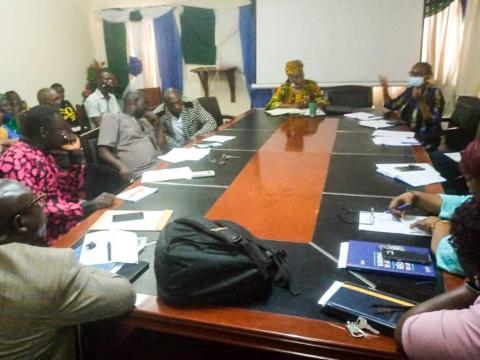By Politico staff writer
The United Nations High Commission for Refugees has decided that by December this year they will fold up their support for Liberian refugees who are still based in Sierra Leone. Head of UNHCR Multi Country Office based in Senegal, Monique Ekoko made the statement in Freetown in the presence of Liberian refugee leaders from across the country.
“I am here to tell you that by the end of this year our support for you as refugees will end. And your nomenclature as Liberian Refugees in Sierra Leone will be no more. We can’t continue to support you forever as refugees because we have other refugees from other countries who are in dire need of this support,” Madam Ekoko said.
“Sierra Leone is no longer a priority, considering the number of refugees which is below 400 and the stability of Liberia,” she added.
Ekoko is a part of a three-person delegation from the UNHCR Multi Country Office who are in the country to negotiate the seeming impasse between refuges from Liberia and the National Commission for Social Action (NaCSA).
During the Liberia civil war in the 90s, Liberians came to Sierra Leone as refugees. For the last two decades their communities have been supported by UNHCR and NaCSA. But both the government of Sierra Leone and UNHCR have agreed that the over two decades of support for refugees have to come to an end.
At the moment NaCSA say there are 392 Liberian refugees in Sierra Leone including few Ivorians.
NaCSA Commissioner, Dr. Sao Kpato Hannah Isatta Max-Kyne said the country was offering two alternatives to the Liberian refugees as support channels for them is winding down. One of the options is to repatriate them back to Liberia or to integrate them legally within Sierra Leonean communities.
“We as a responsible government will be willing to support any of the two decisions you reach. And for those who want to reintegrate we will help you with all the legal documentations necessary, because as Sierra Leoneans we have also experienced being refugees in other parts of the world,” Dr Max-Kyne said.
But Liberian refugee leaders present at the meeting were totally against reintegration, this is so, despite spending the better part of two to three decades in Sierra Leone.
Katuma Moore, the chairlady for refugees in Taima said refugees are already living in deplorable situation across different parts in the country and this is not a good promise for them to reintegrate in Sierra Leone for the foreseeable future.
“As rainy season is here, we will be sleeping under the rains, if you fix the roof the wind is going to blow it away. We have also had our daughters been sexually exploited in these camps and there is no one we can talk to get justice,” Moore said.
David Fayiah, a Chairman as well in Jimmi Gbagbo refugee camp echoed similar concerns. “Show me any evidence that those who have been reintegrated have a better life. Most of us are already leaving in terrible situations. This is a very competitive country if you don’t have a degree you can’t compete for employment, and we are not even educated,” he said.
Despite their concerns the UNCHCR representative said a third option which is resettlement to a third country apart from Liberia and Sierra Leone is off-the table because of the refugees are denying two existing options and the third option is not feasible.
The third option is one which many of the refugees had hoped for, citing an application letter they wrote as far back in 2012 putting together their justifications.
“No other country will accept Liberian refugees, because there is no justification for it and I won’t be making that recommendation because we have other nationals in places like Central African Republic who are being chopped and maimed as we speak,” Ekoko said.
“The Sierra Leone government has been good enough to willingly help those who want to settle, in other countries we (UNHCR) have to beg before they take in refugees,” she added.
As a way of phasing out their support UNHCR said they have a strategic plan with NaCSA to do needs assessment in some of these communities and improve the living standard of refugees. Issues like free medical for some of the most vulnerable population among them will be also be looked in to.
Despite the day long discussions, there is no indication that UNHCR will alter their schedule to fold up the support program for the refugees by the end of the year, some of which included grants to families.
Copyright © 2021 Politico Online








